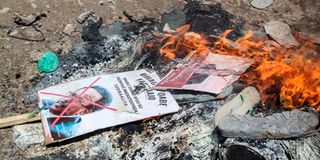Somalia lawmakers cancel term extension as Farmaajo surrenders polls duty

A poster of Somalia's President Mohamed Abdullahi Mohamed are seen in a bonfire during the protest against him in Mogadishu, Somalia, on April 25, 2021.
What you need to know:
- Under a set of concessions on Saturday, Farmaajo said Roble will organise the security and conduct of indirect elections, which now depends on further talks with rivals.
Somalia’s lawmakers on Saturday cancelled a two-year term extension they granted themselves and President Mohamed Farmaajo, ending a heap of pressure on his administration.
The move, which had been expected this week, came after Farmaajo addressed the Lower House of Parliament, conceding electoral power to his Prime Minister Hussein Roble.
Under a set of concessions on Saturday, Farmaajo said Roble will organise the security and conduct of indirect elections, which now depends on further talks with rivals.
It also meant that the Legislature had officially cancelled the extension on his term, whose grant had caused a near-security collapse in the capital Mogadishu as opponents protested.
“I would like to state that our PM will spearhead the process of preparations and the implementation of the electoral process, including key election security arrangements, to ensure elections take in a peaceful and stable atmosphere,” he told the House.

People hold posters of Somalia's President Mohamed Abdullahi Mohamed during the protest against him in Mogadishu, Somalia, on April 25, 2021.
International pressure
Farmaajo’s about-turn, from an extension he had defended as sufficient to prepare for universal suffrage, came after weeks of pressure from the African Union, the United Nations and Western donors.
They all rejected the extension as a move reached without consensus, warning it could drain Somalia’s focus on al-Shabaab and other pressing problems.
The extension also created divisions in the army, seeing commanders defying orders as they chose the side of their respective clans.
Last week, fighting broke out between special forces and soldiers who stood with their political clan leaders. It led to about 100,000 people initially fleeing the city, according to the UN estimates.
In his speech on Saturday, Farmaajo defended his initial steps, arguing they were reached by an independent arm of government enacting legislation to delay elections, rather than extend his term.
“In the past, Parliament's role was limited and it was largely excluded from participating in key decisions affecting the direction of our country. The Parliament that was here before you was dissolved before the end of its term to consolidate power in the hands of a few,” he said in an indirect jab at his predecessor Hassan Sheikh Mohamud, now one of his opponents.
In the elections in 2017, there were delays of several months, but political leaders generally reached a deal for a delay, rather than for Parliament to extend its mandate long after its term had expired.
“In my tenure, I made it a priority to ensure that the Legislature used its constitutional power and took a leading role in the governance of our republic. I ensured all-important agreements reached by the Executive were brought to the you for ratification," Farmaajo said.

Personnel of the Somali military force supporting anti-government opposition leaders are stationed on a street in Mogadishu, Somalia, on April 25, 2021.
Security problem
The declaration could ease the security nightmare in Mogadishu where forces and rival groups had erected mounds of soil to barricade roads.
But the extent of this move can only be known with the buy-in of the President's political rivals. Parliament, the opposition caucus of aspirants known as the Council of Presidential Candidates said on Friday, had no option but to cancel the extension.
The group led by former President Sheikh Sharif Ahmed said Farmaajo would have to resign and participate in talks as an ordinary candidate. But there is the question of whether federal state presidents of Jubbaland and Puntland will take part.
After Farmaajo promised to revise the term last week, the two leaders - Said Abdullahi Deni and Ahmed Madobe - suggested they won’t take part in new talks unless they are guaranteed by the international community and expanded to include more stakeholders like political parties.
Somalia has also declared drought with 80 percent of the country almost receiving no rainfall this season. The country will need at least $50 million to organise indirect elections whose venues must now be discussed and security arrangements decided.
The cancellation of the term extension appeases the calls of the international community, however.





